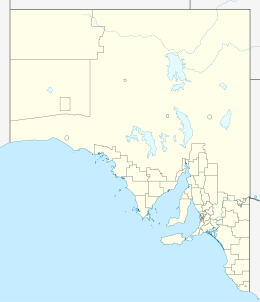Dublin, South Australia
| Dublin South Australia | |||||||||||||
|---|---|---|---|---|---|---|---|---|---|---|---|---|---|
|
Dublin Town Hall | |||||||||||||
 Dublin | |||||||||||||
| Coordinates | 34°27′0″S 138°21′0″E / 34.45000°S 138.35000°ECoordinates: 34°27′0″S 138°21′0″E / 34.45000°S 138.35000°E | ||||||||||||
| Population | 241 (2006 census)[1] | ||||||||||||
| Postcode(s) | 5501 | ||||||||||||
| Location | |||||||||||||
| LGA(s) | Adelaide Plains Council[2] | ||||||||||||
| State electorate(s) | Goyder[3] | ||||||||||||
| Federal Division(s) | Wakefield[4] | ||||||||||||
| |||||||||||||
Dublin is a small town on the Adelaide Plains in South Australia, 61 kilometres (38 mi) north of the state capital, Adelaide. Situated on Highway 1, the town is surrounded by farmland and rural industry. Along with nearby Windsor the area is home to a growing commuter population. At the 2006 census, Dublin had a population of 241.[1]
Dublin is in the federal Division of Wakefield, the state electoral district of Goyder and the Adelaide Plains Council.[2][3][4] Dublin lies in the cadastral Hundred of Dublin which was named after the Irish capital, Dublin in 1856.[5][6]
The South Australian Livestock Exchange saleyards are located southeast of the township, replacing earlier saleyards closer to Adelaide at Gepps Cross in 1999 for sheep, lambs and pigs, and 2003 for cattle.[7]
There were two Schools, one in the town and another at Stony Point junction.[8] The Stony Point School was on the corner of Dublin Road, Windsor Road and Shannon Road from 1876 to 1906. The Dublin School was from 1881 to 1972.[9]
Hundred of Dublin
| Hundred of Dublin South Australia | |||||||||||||
|---|---|---|---|---|---|---|---|---|---|---|---|---|---|
| Established | 27 May 1856 | ||||||||||||
| Area | 310 km2 (119.7 sq mi) | ||||||||||||
| County | Gawler | ||||||||||||
| |||||||||||||
The Hundred of Dublin is a cadastral unit of hundred located on the northern Adelaide Plains in South Australia and centred on the town of Dublin.[5] It is one of the eight hundreds of the County of Gawler.[10] It was named in 1856 by Governor Anthony Musgrave.[5]
The following localities and towns of the Adelaide Plains Council area are situated inside (or largely inside) the bounds of the Hundred of Dublin:
- Dublin
- Thompson Beach
- Webb Beach
- Parham
- Windsor
- Calomba
- Wild Horse Plains (southern half)
- Long Plains (southern half)
Gallery
-
Dublin South Australia
-
Uniting Church
See also
References
- 1 2 Australian Bureau of Statistics (25 October 2007). "Dublin (L) (Urban Centre/Locality)". 2006 Census QuickStats. Retrieved 2008-10-08.
- 1 2 3 4 5 6 7 8 9 10 "Development Plan - Mallala Council" (PDF). Department of Planning Transport and Infrastructure. pp. 248, 258 & 261. Retrieved 24 July 2015.
- 1 2 "Goyder electorate boundaries as of 2012". ELECTORAL COMMISSION SA. Retrieved 23 July 2015.
- 1 2 "Federal electoral division of Wakefield" (PDF). Australian Electoral Commission. Retrieved 23 July 2015.
- 1 2 3 "Search for 'Hundred of Dublin' (ID SA0020882)". Government of South Australia. Retrieved 16 February 2016.
- ↑ "Hundred of Dublin". PlaceNames Online - South Australian State Gazetteer. Government of South Australia. Archived from the original on 30 September 2007. Retrieved 2006-04-06.
- ↑ Maurovic, Richard (2007). The Meat Game: A History of the Gepps Cross Abattoirs and Livestock Markets. p. 278. ISBN 978 1 86254 726 1. Retrieved 8 December 2015.
- ↑ "Mallala now and then". 15 September 2016.
- ↑ "Mallala now and then - Dublin School". 15 September 2016.
- ↑ South Australia hundred maps 1:63 360. Surveyor General's Office. 1867.
External links
- the Dublin History Group web site www.dublinhistorygroup.com.au